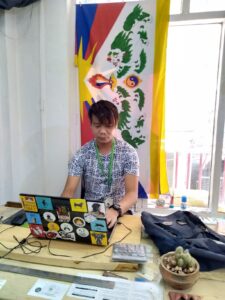Jayang Bogdo has only a faint memory of his parents and their home in Delhi. He remembers that only English was spoken and that he attended a private school for kindergarten. His early childhood ended when both parents were killed in an accident. Private school was no longer an option. Jayang went to live with his grandmother, a woman he has always loved and respected and after a short stay with her he was sent to Tibetan Children’s School in McLeod Ganj for first grade and graduated from there years later.
In first grade life was difficult – he was alone without family or friends and the other children spoke Tibetan but he only knew English. They made fun of him and some bullies made things even worse. When he saw classmates with their parents he often felt a sense of loss. By the fourth grade, however, Jayang became more confident and assertive having learned Tibetan. He had made friends and done well in his studies. While not wanting to fight, he decided to stand up to the bullies, surprising them immensely after which they left him alone.
As a teenager Jayang felt emotional support from many women teachers as well as his grandmother. She visited him at school periodically and saw that he had clothes and a little money, while his teachers gave him daily support. They took an interest in him, gave him advice and frequently invited him on outings and to their homes. He was often mischievous, but they overlooked his pranks, saying, “boys will be boys.”
After graduation Jayang went to Chandigarh College for his Bachelors degree and then worked in a call centre. For four years he was swallowed up in the “rat race” working nights in a confined and pressured environment. Hours were long and demands were exhaustive but the money was good. On weekends he partied with casual friends and slept the days away. Externally he had achieved a successful life, but internally he was not happy.It was too easy for him to get anxious, frustrated and angry, distracted and tense, too far removed from the Tibetan culture. That was not how he wanted to live: he quit his job.
He arrived in back in McLeod Ganj in March, 2016 once again to build a new life and this time he was determined to build it based on Tibetan values of compassion, responsibility, meaningful relationships and work. He felt and continues to feel the presence of His Holiness the Dalai Lama and frequently asks himself how His Holiness might view what he is thinking or doing. “I imagine His Holiness looking over my shoulder and I try to refrain from the things I know would not please him,” he said.
His curiosity was free to roam and Jayang soon began observing things around him, wanting to notice everything in his environment. He became aware of people’s subtle cues and would check to see if a person’s eyes and mouth were saying the same thing. He observed ways the body communicates true feelings. Before long he began to take photos to capture the feelings he saw expressed.
Jayang began documenting the lives of ordinary Tibetans. He found work at Hope Café and Gallery with Kunsang Tenzin, a mentor he admires and learns from daily. Together they document lives of ordinary Tibetans with photos and stories for present and future generations. “It is not all about the outer world. It is about the way we Tibetans face problems and issues, dealing with suffering through compassion and control of our minds. Being without our country is an issue we each deal with personally while we remain grateful to India for allowing us to stay here.”
In answer to the question, “What kind of future do you see for yourself?” he replied, “I really don’t know how to answer that question because I never think about what kind of job or career I want, and that’s what people talk about for their future. I don’t care about success and material possessions. I just want to become a better person, to have more compassion, to feel peaceful in my mind and be happy”.





 Print
Print Email
Email













